|
|
|
Sort Order |
|
|
|
Items / Page
|
|
|
|
|
|
|
| Srl | Item |
| 1 |
ID:
178723
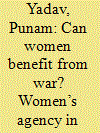

|
|
|
|
|
| Summary/Abstract |
Women’s agency in Peace and Conflict Studies has received increased policy attention since the formulation of UN Security Council Resolution in 2000. Academic attention regarding this question has, as a result, also increased dramatically in the intervening period. Women today, as a consequence, are not just seen as victims of conflict, but also as agents of change. Despite their vulnerabilities in the situations created by conflict, women may be exposed to new knowledge and opportunities, which may have positive impacts on their lives. Therefore, it is important to recognize the lived realities and the multiple stories of postwar societies to address the new needs of people and build a sustainable peace. This article examines the everyday lives of women in post-conflict Nepal to demonstrate the significant transformations that have taken place since the war. It specifically investigates conflict-induced social and structural changes through the lived experiences of women tempo drivers, war widows, women ex-combatants and women politicians. This article is based on the analysis of 200 interviews and six focus group discussions (FGDs) carried out over a period of 12 years in seven districts of Nepal.
|
|
|
|
|
|
|
|
|
|
|
|
|
|
|
|
| 2 |
ID:
178727


|
|
|
|
|
| Summary/Abstract |
While a dominant position in research on compliance holds that enforcement is necessary for states to abide by their international commitments, many international organizations (IOs) do not have recourse to such coercive means. This article offers the first systematic analysis of one prominent alternative to material coercion: compliance reporting by IOs. It develops an argument for why reporting by IOs should lead states to correct non-compliant behavior, and when those effects should be particularly strong. It tests this argument in the context of the International Labour Organization (ILO), which offers a unique setting for evaluating the impact of reporting in the absence of coercion. The principal findings are threefold. First, reporting has significant and durable effects on state respect for labor rights. Second, reporting affects compliance both immediately and when repeated over longer periods of time. Third, reporting has stronger effects on improvements in labor rights when target states are democratic and resourceful, and have a stronger presence of labor NGOs. By contrast, it does not matter to reporting’s effect whether states are highly economically dependent on the outside world or whether reporting is coupled with active shaming of non-compliant states. Taken together, our results suggest that existing research has not fully appreciated the potential of monitoring systems based on reporting to generate compliance with international rules. While hard enforcement may still be important, especially in areas where incentives to renege are strong, the findings of this article suggest that it is not the exclusive path to compliance.
|
|
|
|
|
|
|
|
|
|
|
|
|
|
|
|
| 3 |
ID:
178733
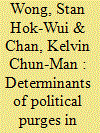

|
|
|
|
|
| Summary/Abstract |
Why would dictators purge members of their ruling coalition? Some argue that doing so can minimize the risk to dictators’ political survival, while others contend that dictators who mount purges are motivated by the desire to share resources with fewer allies. In this study, we analyze an original dataset, compiled from biographical data on the subordinates of the founding emperors of seven ancient Chinese imperial dynasties. Analyzing the data with competing risks models, we find that military experience is a strong predictor of political purges. Emperors were less likely to execute officers who had fought in more battles, but more likely to execute commanders, especially those who had established military credentials prior to the founding of an empire. In addition, the incidence of political purges heightened toward the end of an emperor’s life, which implies that the founding emperors were concerned about the security threats against their designated successors. Potential challengers came not only from the military, but also from the aristocracy. Indeed, we find that the blood relatives of the emperors were more likely to experience a mild form of purges: deprivation of titles. These findings suggest that dictators are more likely to use purges to reduce existential threats.
|
|
|
|
|
|
|
|
|
|
|
|
|
|
|
|
| 4 |
ID:
178710
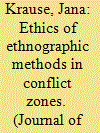

|
|
|
|
|
| Summary/Abstract |
This article examines the ethics of using ethnographic methods in contemporary conflict zones. Ethnographic research is an embodied research practice of immersion within a field site whereby researchers use ethnographic sensibility to study how people make sense of their world. Feminist, conflict and peacebuilding scholars who research vulnerable populations and local dynamics especially value ethnographic approaches for their emphasis on contextual understanding, human agency, egalitarian research relationships and researcher empathy. While immersion leads to knowledge that can hardly be replaced by using more formal approaches, it also elicits ethical dilemmas. These arise not only from the specific research context but also from who the researcher is and how they may navigate violent and often misogynous settings. I argue that many dilemmas may and perhaps should not be overcome by researcher skill and perseverance. Instead, ethical challenges may lead researchers to adopt limited and/or uneven immersion in their field site, not as failed or flawed ethnography but as an ethical research strategy that incorporates ethnographic sensibility to a varying extent. Examining why researchers may opt for limited and uneven immersion is important because in conflict research, stereotypes of the intrepid (male) researcher with a neutral gaze still tend to mute open discussions of how gender, race, ethnicity, nationality, class and other background factors inevitably shape immersion. This article seeks to contribute to creating discursive space for these conversations, which are vital for researchers to analyse, reflect and write from the position of a ‘vulnerable observer’ and incorporate greater transparency in the discussion of research findings.
|
|
|
|
|
|
|
|
|
|
|
|
|
|
|
|
| 5 |
ID:
178720
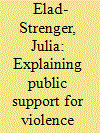

|
|
|
|
|
| Summary/Abstract |
What drives citizens’ support for violence against domestic political actors? Despite its potentially devastating consequences, there is surprisingly little research on the antecedents of this unique form of political violence. Building upon recent insights on the psychological implications of exposure to conflict on support for political violence, we examined the motivations underlying public support for violence against politicians in the context of protracted conflict. Using a two-wave panel design among Jewish-Israelis, we examined the interactive effects of conflict-induced perceived threat, psychological distress, and political orientation on support for violence against politicians. Consistent with previous findings on the psychological implications of conflict, our findings suggest that conflict-induced threat perceptions play an important role in predicting support for violence against politicians. Nevertheless, our findings point to important boundary conditions to these effects: the strength of the relationship between perceived threat and attitudes towards political violence is qualified by the level of chronic conflict-related psychological distress, and the direction of the effects of perceived threat is qualified by individuals’ self-placement on the left-right continuum. More specifically, we found that perceived threat increased rightists’ support and decreases leftists’ support for violence against politicians, only under high, but not low, conflict-related psychological distress. The main conclusion of this study is that support for violence against politicians can be seen as an ideology-driven protective strategy against the negative psychological implications of exposure to violent conflict. By pointing to the importance of understanding the interactive role of psychological and political factors in determining public support for such acts, our findings therefore contribute to the understanding of a relatively understudied phenomenon with potentially catastrophic effects on political stability.
|
|
|
|
|
|
|
|
|
|
|
|
|
|
|
|
| 6 |
ID:
178725
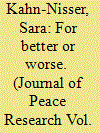

|
|
|
|
|
| Summary/Abstract |
Does it matter whether human rights (HR) shaming is accompanied by acknowledgments of reforms and progress? Do such acknowledgments weaken or strengthen the impact of shaming? Rulers decide whether to oppress or to comply with HR treaty obligations by considering what compliance entails and by weighing the internal and external costs and benefits of oppression. Research shows that HR shaming alters such considerations and is associated with changes in HR protection levels. Can the same be said of faming? This article examines three forms of HR reporting: faming, which focuses on positive developments; shaming, which focuses on problematic HR practices; and scrutiny, which combines shaming and faming. The article analyzes the association between shaming, faming, and scrutiny by UN treaty bodies, on the one hand, and oppression on the other. The potential associations are conceptualized as mitigation, backsliding, and specification. The analysis finds that shaming with no faming and faming with no shaming are each negatively associated with HR protection. Scrutiny, the combination of shaming and faming, is positively associated with subsequent HR protection levels, and the higher the level of scrutiny the higher the subsequent level of HR protection. The article argues that the reason for this association is that the combination of shaming and faming helps policymakers understand how to properly implement their treaty obligations and how to improve HR protection. The article draws policy and theoretical implications including the need for balanced and detailed HR reporting, and the importance of learning in HR advocacy.
|
|
|
|
|
|
|
|
|
|
|
|
|
|
|
|
| 7 |
ID:
178721
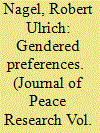

|
|
|
|
|
| Summary/Abstract |
To what extent do gender relations in society influence the likelihood of negotiations during intrastate disputes? A substantial body of literature recognizes gendered inequalities as integral to understanding conflict, yet they have received little attention in systematic studies of conflict management. I argue that patriarchal gender relations that reflect a preference for masculinity over femininity influence states’ propensity to negotiate with rebels. I draw on the concept of practices to explain how gender relations shape government preferences for negotiations. Specifically, I contend that practices of excluding women from fully participating in public life institutionalize violence as the preferred way of managing conflict. The implication is that countries with more patriarchal gender relations are less likely to engage in negotiations during intrastate conflicts. I test this argument on all civil conflict dyads between 1975 and 2014. The analyses show that countries that marginalize women’s participation in public life are significantly less likely to engage in negotiations. The results provide strong support for my theoretical argument and offer systematic evidence in support of core claims of the feminist peace theory.
|
|
|
|
|
|
|
|
|
|
|
|
|
|
|
|
| 8 |
ID:
178735
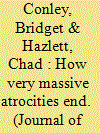

|
|
|
|
|
| Summary/Abstract |
Understanding how the most severe mass atrocities have historically come to an end may aid in designing policy interventions to more rapidly terminate future episodes. To facilitate research in this area, we construct a new dataset covering all 43 very large mass atrocities perpetrated by governments or non-state actors since 1945 with at least 50,000 civilian fatalities. This article introduces and summarizes these data, including an inductively generated typology of three major ending types: those in which (i) violence is carried out to its intended conclusion (37%); (ii) the perpetrator is driven out of power militarily (26%); or (iii) the perpetrator shifts to a different strategy no longer involving mass atrocities against civilians (37%). We find that international actors play a range of important roles in endings, often involving encouragement and support for policy changes that reduce mass killings. Endings could be attributed principally to armed foreign interventions in only four cases, three of which involved regime change. Within the cases we study, no ending was attributable to a neutral peacekeeping mission.
|
|
|
|
|
|
|
|
|
|
|
|
|
|
|
|
| 9 |
ID:
178729


|
|
|
|
|
| Summary/Abstract |
Does terrorism inhibit a country’s ability to attract international direct investment? If so, terrorism may have large costs in terms of employment losses, macroeconomic instability, and missed development opportunities. However, do investors fear terrorism because of direct risks to their assets, or because the opportunities in the host country deteriorate? And how do they adjust investments? We study the impact of terrorism on merger and acquisition decisions of 8,872 firms over 116 countries over 16 years. The firm-level perspective allows the isolation of host-country terrorism from firm-level characteristics such as size or experience as an explanation, by comparing decisions for the same firm across destinations. It also allows separation of investment responses into reductions or entire withholding of investment. A sample standard deviation increase in terrorism reduces merger and acquisition investment by around 30%. Firms do not generally reduce the size of their investment in the face of terrorism – instead, they decide not to enter the country altogether. We find no evidence to suggest that multinational firms are more sensitive to attacks on local business assets. A country-level analysis, which necessarily does not control for firm-level characteristics, yields materially different conclusions.
|
|
|
|
|
|
|
|
|
|
|
|
|
|
|
|
| 10 |
ID:
178716
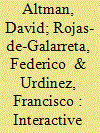

|
|
|
|
|
| Summary/Abstract |
Democracies do not take up arms against each other. Although this axiom has attained the status of a mantra in the field of international relations, this statement is much more complex than it appears, in part because it is highly contingent on the definitions and operationalizations of both democracy and conflict. This article revisits democratic peace theory, combining both institutional constraints and similarity-based arguments. Interactions between the democratic level of the dyad (the average democratic level of its members) and its democratic spread (difference between the democratic scores of its members) create a dyadic triangle that encompasses all possible combinations of cases, revisiting which dyads are more prone to conflict. The findings partially confirm and partially refute both the institutional constraints and the similarity-based arguments, leading to a nuanced alternative theory: the Interactive Model of Democratic Peace. Akin to democratic peace theory, our evidence shows that the higher a dyad’s level of democracy is, the lower the probability of fatal militarized interstate disputes between that pair of states. However, contrary to democratic peace theory, we find that dissimilar-regime dyads can still be peaceful as long as they have a high mean of democracy. Following the theory of regime similarity, we consider the democratic spread of each dyad, but we find that being similar is not a sufficient condition for peace between the members of a dyad. From the empirical evidence, the article derives three heuristic zones of conflict, filling much of the gray area that has been left unexplained by previous models.
|
|
|
|
|
|
|
|
|
|
|
|
|
|
|
|
| 11 |
ID:
178731
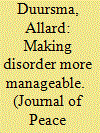

|
|
|
|
|
| Summary/Abstract |
Much of the quantitative conflict resolution literature focuses on mediation between states or on efforts to end a civil war through a comprehensive peace agreement that brings peace to the entire country. This article instead analyses the effectiveness of mediation between a wide range of armed actors on a subnational level. Utilizing unique data on Darfur covering the January 2008–August 2009 period, this article finds that mediation efforts following armed clashes in a given area significantly prolong local lulls in fighting in this area. This finding remains robust when controlling for the presence of a peacekeeping base, battle-deaths and the type of armed actors engaged in armed clashes. In addition, the finding remains robust when accounting for the non-random assignment of mediation efforts through matching similar observations in the dataset. Finally, anecdotal evidence from sites of armed conflict beyond Darfur suggest that the findings from this study might also hold in other armed conflicts.
|
|
|
|
|
|
|
|
|
|
|
|
|
|
|
|
| 12 |
ID:
178717


|
|
|
|
|
| Summary/Abstract |
Recent research has focused on the legacies of civil war violence on political preferences, finding that wartime victimization decreases support for the perpetrator or its political identity in the long run. However, we know little about the conditions under which this effect takes place. Historical accounts from civil wars suggest that the long-term effect of violence is not homogenous, nor consistent across areas within a single conflict. Addressing this gap, this article explores the effects of wartime victimization on long-term political preferences at the local level, looking at the conditioning effect of the local social context. In particular, I argue that the effect of wartime violence depends on the existence of local networks that create and maintain memories of the violence and capitalize on them for future mobilization. This argument is tested in the context of the Spanish Civil War. I build a novel dataset using archival data, historical secondary sources, and already existing datasets, covering 2,100 municipalities across Spain. In line with the argument, it is found that Francoist wartime victimization during the civil war is linked to an increase in leftist vote share after democracy was restored four decades later, but mainly in those municipalities where clandestine, left-leaning political networks were active after the conflict.
|
|
|
|
|
|
|
|
|
|
|
|
|
|
|
|
| 13 |
ID:
178732
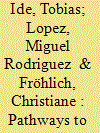

|
|
|
|
|
| Summary/Abstract |
As hydro-meteorological hazards are predicted to become more frequent and intense in the future, scholars and policymakers are increasingly concerned about their security implications, especially in the context of ongoing climate change. Our study contributes to this debate by analysing the pathways to water-related conflict onset under drought conditions in the Middle East and North Africa (MENA) region between 1996 and 2009. It is also the first such analysis that focuses on small-scale conflicts involving little or no physical violence, such as protests or demonstrations. These nonviolent conflicts are politically relevant, yet understudied in the literature on climate change and conflict, environmental security, and political instability. We employ the method of qualitative comparative analysis (QCA) to integrate quantitative and qualitative data at various scales (national, regional, local) for a sample of 34 cases (17 of which experienced conflict onset). Our findings show that pre-existing cleavages and either autocratic political systems or cuts of the public water supply are relevant predictors of nonviolent, water-related conflict onset during droughts. Grievances deeply embedded into socio-economic structures in combination with a triggering event like a drought or water cuts are hence driving such water-related conflicts, especially in the absence of proper political institutions. We thus argue that drought–conflict links are highly context-dependent even for nonviolent, local conflicts, hence challenging determinist narratives that claim direct interlinkages between climate change, hydro-meteorological disasters and conflict.
|
|
|
|
|
|
|
|
|
|
|
|
|
|
|
|
| 14 |
ID:
178714


|
|
|
|
|
| Summary/Abstract |
Peacekeeping operations are integral to multilateral strategies to help establish stable, self-sustaining peace and development in countries coming out of civil war. While we know, from macro-level empirical studies, that these operations contribute to the durability of peace, the evidence on their effectiveness at the micro level remains scant. Using surveys and administrative data from postwar Liberia, we test the hypothesis that peacekeeping deployments build peace ‘from the bottom up’ through contributions to local security and local economic and social vitality. The hypothesis reflects official thinking about how peacekeeping works via ‘peacebuilding’. We create a quasi-experiment by applying coarsened exact matching to administrative data used in mission planning, identifying sets of communities that were similarly likely to receive bases. We do not find effects on local security measured in terms of physical victimization, fear of victimization, or migration patterns. We find only modest effects on socio-economic vitality. NGOs tend to work in areas where deployments are not present, contrary to the hypothesis. Thus, we are less inclined to believe that peacekeepers build peace from the bottom up, leaving macro-level mechanisms such as signaling and deterrence at the level of leaders as worthy of more attention. In terms of policy, peacekeeping missions should re-evaluate their methods for providing local security.
|
|
|
|
|
|
|
|
|
|
|
|
|
|
|
|
| 15 |
ID:
178728


|
|
|
|
|
| Summary/Abstract |
Literatures on the influences of missile defense (MD) on the existing nuclear deterrence are divided into negative and positive perspectives. However, both sides seem to make contradictory arguments. Skeptics argue that it is not feasible that MD influences deterrence stability but that it causes security dilemma and arms race, while proponents suggest that MD does not have to be perfect to reinforce deterrence stability but that it does not cause security dilemma and arms race. To fix this logical inconsistency, we identify an additional variable which is crucial in understanding the security dilemma mechanism in addition to Jervis’s (1978) two variables. By adding another variable, a minimum MD effectiveness level required for deterrence success suggested by Quackenbush (2006), to Jervis’s framework, we develop three hypotheses, two of which are novel on MD and its potential influences on deterrence stability and arms race. We then introduce a probabilistic model of the MD effectiveness by modifying Wilkening’s (2000) and conduct simulation analysis to see if MD is more likely to incur security dilemma and arms race. Our simulation results show that MD influence is likely to be different depending on a potential challenger’s national capability. Against a great power challenger, MD is least likely to meet the minimum MD effectiveness level required for deterrence success, so that the challenger is more likely to respond flexibly to the defender’s buildup of MD. Against a newly nuclear-armed state, however, a defender’s MD is more likely to satisfy the minimum MD effectiveness level, so that the defender is highly likely to respond flexibly to the potential challenger’s reinforcement effort of its nuclear force. In either case, our simulation results indicate that arms races concerning MD among them are not likely to occur.
|
|
|
|
|
|
|
|
|
|
|
|
|
|
|
|
| 16 |
ID:
178713
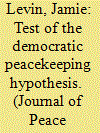

|
|
|
|
|
| Summary/Abstract |
While peacekeeping’s effects on receiving states have been studied at length, its effects on sending states have only begun to be explored. This article examines the effects of contributing peacekeepers abroad on democracy at home. Recent qualitative research has divergent findings: some find peacekeeping contributes to democratization among sending states, while others find peacekeeping entrenches illiberal or autocratic rule. To adjudicate, we build on recent quantitative work focused specifically on the incidence of coups. We ask whether sending peacekeepers abroad increases the risk of military intervention in politics at home. Drawing on selectorate theory, we expect the effect of peacekeeping on coup risk to vary by regime type. Peacekeeping brings with it new resources which can be distributed as private goods. In autocracies, often developing states where UN peacekeeping remuneration exceeds per-soldier costs, deployment produces a windfall for militaries. Emboldened by new resources, which can be distributed as private goods among the selectorate, and fearing the loss of them in the future, they may act to depose the incumbent regime. In contrast, peacekeeping will have little effect in developed democracies, which have high per-troop costs, comparatively large selectorates, and low ex-ante coup risk. Anocracies, which typically have growing selectorates, and may face distinctive international pressures to democratize, will likely experience reduced coup risk. We test these claims with data covering peacekeeping deployments, regime type, and coup risk since the end of the Cold War. Our findings confirm our theoretical expectations. These findings have implications both for how we understand the impact of participation in peacekeeping – particularly among those countries that contribute troops disproportionately in the post-Cold War era – and for the potential international determinants of domestic autocracy.
|
|
|
|
|
|
|
|
|
|
|
|
|
|
|
|
| 17 |
ID:
178724


|
|
|
|
|
| Summary/Abstract |
The United Nations is one of the organizations charged with developing and promoting international human rights law. One of the primary ways that the United Nations tries to do that is by regularly reviewing the human rights practices of member states and then recommending new policies for that state to implement. Although this expends considerable resources, a number of obstacles have made it difficult to empirically assess whether the UN’s review process actually causes countries to improve their human rights practices. To study this topic, we conducted an experiment in Pakistan that tested whether respondents were more likely to support policies aimed at improving women’s rights when they learned that the reforms were proposed by the United Nations. Our results indicate that the respondents who were randomly informed of the United Nations endorsement not only expressed higher support for the policy reforms, but also were more likely to express willingness to ‘mobilize’ in ways that would help the reforms be implemented. Our treatment did not have any effect, however, on respondents that did not already have confidence in the United Nations. This suggests that the international human rights regime may only be able to aid domestic reformers when there is already faith in those institutions.
|
|
|
|
|
|
|
|
|
|
|
|
|
|
|
|
| 18 |
ID:
178734


|
|
|
|
|
| Summary/Abstract |
This article presents an update to the ViEWS political Violence Early-Warning System. This update introduces (1) a new infrastructure for training, evaluating, and weighting models that allows us to more optimally combine constituent models into ensembles, and (2) a number of new forecasting models that contribute to improve overall performance, in particular with respect to effectively classifying high- and low-risk cases. Our improved evaluation procedures allow us to develop models that specialize in either the immediate or the more distant future. We also present a formal, ‘retrospective’ evaluation of how well ViEWS has done since we started publishing our forecasts from July 2018 up to December 2019. Our metrics show that ViEWS is performing well when compared to previous out-of-sample forecasts for the 2015–17 period. Finally, we present our new forecasts for the January 2020–December 2022 period. We continue to predict a near-constant situation of conflict in Nigeria, Somalia, and DRC, but see some signs of decreased risk in Cameroon and Mozambique.
|
|
|
|
|
|
|
|
|
|
|
|
|
|
|
|
| 19 |
ID:
178730


|
|
|
|
|
| Summary/Abstract |
Uncertainty about capabilities or resolve is a prominent explanation for war between states. However, we know comparatively little about uncertainty as a cause of armed conflict between domestic actors. This article proposes that irregular leader change in a neighboring country generates uncertainty about third-party resolve and thus increases the likelihood of intrastate armed conflict. I argue that domestic actors take potential third parties’ capabilities and resolve into account when bargaining, that neighboring countries are important potential third parties, and that irregular leader change among these potential third parties results in uncertainty because there is an increased risk of foreign policy change combined with limited access to information. With uncertain estimates of third-party resolve, the risk of bargaining failure and armed conflict increases. Global spatial analyses spanning 1946–2014 corroborate the argument. As expected, I find that irregular leader change in one or more neighboring countries increases the probability of intrastate armed conflict onset. The results are robust across three different distance thresholds for neighboring countries, using time and country fixed effects and several alternative model specifications. Overall, this article advances our knowledge about uncertainty as a cause of civil war and sheds new light on the adverse consequences of irregular leader change.
|
|
|
|
|
|
|
|
|
|
|
|
|
|
|
|
|
|
|
|
|